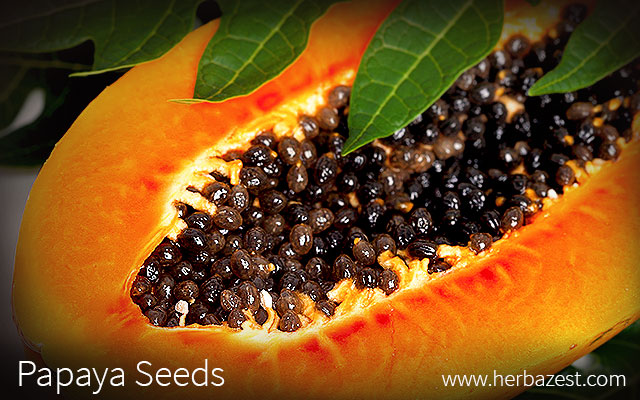Papaya seeds are edible and can be found within the inner cavity of the Carica papaya fruit. With a fleshy, translucent outer coating that prevents them from germinating inside of the fruit, papaya seeds are pea-shaped and darkly-colored, growing to approximately a quarter inch (6 mm) in diameter.
Benefits of Papaya Seeds
When thinking about papaya, seeds are not the most popular part of the plant, and they actually constitute approximately 22% of processing waste. However, papaya seeds are comprised of nearly 32% carbohydrates, 25% oils with a very low level of polyunsaturated fatty acids, high levels of crude papaya protein and fiber, and a potent germicidal compound called benzylisothiocyanate.
A FERMENTATION PROCESS IS OFTEN USED TO ENHANCE THE NUTRITIONAL QUALITIES AND BIOAVAILABILITY OF PAPAYA SEEDS.
One of the main benefits of papaya seeds is their bactericidal resistance against several prominent illness-triggering strains of Staphylococcus aureus, Bacillus cereus, and Escherichia coli. Moreover, scientific reports highlight their ability to protect the body from oxidative stress, one of the main culprits of cellular damage and aging in the body. For these reasons, papaya seeds have also found a home within both commercial and home cosmetic preparations.
Additionally, as published in Scientific Research and Essay (2009), the use of fermented papaya seeds has proven safe for improving female fertility, contrary to the abortifacient effects of unfermented papaya seeds.
Fermented papaya seeds also constitute an important source of protein in the great savannah regions of west and central Africa, where the standard diet is rich in carbohydrates.
Uses of Papaya Seeds
While many people wonder what to do with papaya seeds besides planting them, various other imaginative culinary and medicinal uses of papaya seeds have been developed around the world.
With a bold, peppery taste, papaya seeds are commonly dried, ground, and incorporated as a savory food spice. They are rich in papain, the enzyme that serves as a beer clarifier or as a tenderizer for meat. In Indonesia, papaya seeds give flavor to salad dressings, koftas, kebabs, and other meat dishes. Indians use them as an adulterant for black pepper within the commercial spice market.
In traditional folk practices, papaya seeds are ground, pulped, infused, or otherwise consumed with the raw papaya fruit as a medicinal treatment for digestive issues and irregular menstrual periods, as well as intestinal parasites and other infections.
How to Collect Papaya Seeds
From the flesh of the longitudinally-halved papaya fruits, seeds are first scooped out using a spoon and later dried using a food dehydrator. Alternatively, flat, evenly-arranged papaya seeds can be left in sunlight for several days to achieve similar results. They are stored in a cool, dry place using a sandwich bag or airtight container. Freezing them is also recommended for long-term use lasting more than a week.
How to Buy Papaya Seeds
Despite their availability throughout a number of reputable plant nurseries, ethnic markets, and online seed merchants, to buy fresh papaya seeds, one need only find a supermarket or grocery store that carries the tropical fruits.
Both dried and powdered papaya seeds are also available, though the quality degrades rapidly after they are crushed. What to do with papaya seeds once they've been purchased depends on personal tastes and individual health needs.
Papaya seeds are edible and known for their peppery taste. However, their everyday uses go far beyond savory cuisine. With many creative and innovative uses in cosmetics and herbal healthcare, the benefits of papaya seeds can be shared by all.
Sources
- Breeding Plantation Tree Crops: Tropical Species, p. 128
- Duke's Handbook of Medicinal Plants of Latin America, pp. 171 - 172
- Harvesting and Post-Harvest Handling of Papayas in the Caribbean, p. 21
- International Journal of Applied Research in Natural Products, The aqueous seed extract of Carica papaya Linn. Prevents carbon tetrachloride induced hepatotoxicity in rats, 2009
- Nuts and Seeds in Health and Disease Prevention, pp. 857 - 859
- Papaya the Medicine Tree, pp. 21 - 23, 30, 35 - 36, 73
- Propagation of Horticultural Crops, pp. 15 - 18
- Scientific Research and Essay, Effect of fermented and unfermented seed extracts of Carica papaya on pre-implantation embryo development in female Wistar rats (Rattus norvegicus), 2009




